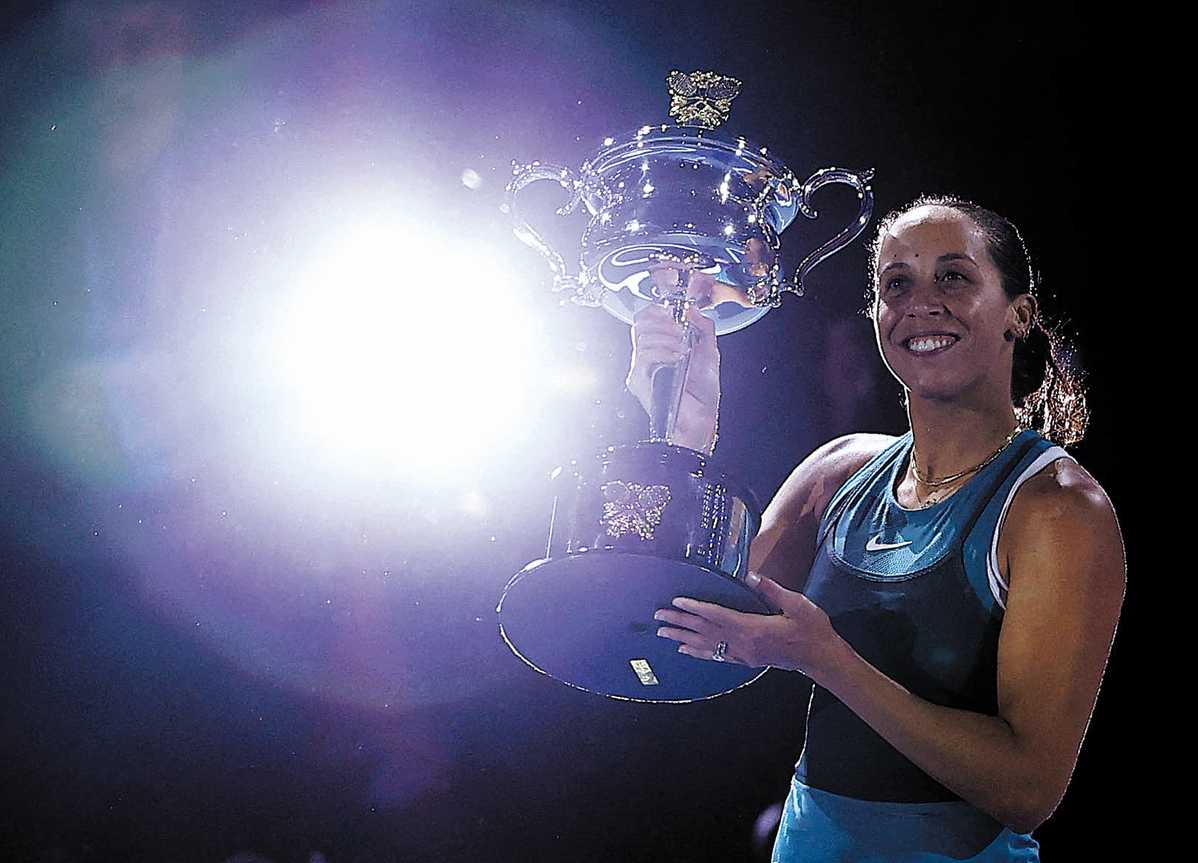
Madison Keys poses with the Daphne Akhurst Memorial Cup after winning the Australian Open final on Saturday. REUTERS
MELBOURNE — An inspired Madison Keys ripped up the script with a bold and brilliant performance to end Aryna Sabalenka's Australian Open reign and win her maiden Grand Slam trophy on Saturday.
Keys' 6-3, 2-6, 7-5 victory stopped Belarusian Sabalenka's bid to become the first woman to claim three straight Melbourne Park titles since Switzerland's Martina Hingis from 1997-99, and ended her 20-match winning streak on the court at Rod Laver Arena.
Keys' victory made her, at 29, the fourth-oldest first-time Grand Slam winner in the professional era, behind only Flavia Pennetta, Ann Jones and Francesca Schiavone.
"Everything happens for a reason," Keys said with champagne in her hand and the Daphne Akhurst Memorial Cup beside her.
"I had to go through some tough things. It forced me to look at myself in the mirror and try to work on the internal pressure that I was putting on myself ... I got to the point where I was proud of myself and my career with or without a Grand Slam.
"I didn't need it to feel like I had a good career, or that I deserved to be talked about as a great tennis player.
"Finally letting go of that gave me the ability to actually go out and play some really good tennis, to actually win a Grand Slam."
Sabalenka made a couple of untimely double faults to drop serve in the opening game and looked slightly off color in the early exchanges, as Keys heaped pressure on the top seed with a dipping cross-court winner en route to a double break.
The 19th seed rode her luck after a net cord winner and went ahead 5-1 in 20 minutes, before conceding a break with a wayward backhand. However, Sabalenka gifted Keys a set point with her fourth double fault.
Hitting harder than her opponent on both flanks, Keys blasted the 11th of her 29 winners with a backhand down the line to take the set, but Sabalenka began to mix up her game in the next set and sliced her way through to level the match.
Both players relied on their powerful serves and accuracy to remain level until 5-5 in the decider, but there was one final momentum shift as Keys produced blistering winners to claim the next two games and the biggest triumph of her career.
Tears shed
She was overcome by emotion and shed tears with her team that included husband and coach Bjorn Fratangelo in the stands, while Sabalenka smashed her racket and then covered her face with a towel before sobbing.
"There definitely was a bit of frustration, because I was so close to achieving something crazy," Sabalenka said.
"I was just trying to let it go and be a good person, be respectful. It's okay. I know that after tough losses, there are good wins. I'll keep working and make sure that next time, if I'm in this situation, I'll play better."
Keys is the first player to claim the trophy by defeating both the world No 1 and No 2 at a major since Russian Svetlana Kuznetsova at the 2009 French Open, and the first at Melbourne Park since compatriot Serena Williams 20 years ago.
Tipped to become a world No 1 after she reached the Australian Open semifinals at 19, Keys lost to fellow American Sloane Stephens in the 2017 US Open final and struggled to translate deep runs at majors into titles.
Three years ago she spoke about the "dark pit of despair" she was in when her career had stalled due to the suffocating pressure of trying to stay at the top level of the sport.
Biggest prize
She came close to another final when she led Sabalenka 6-0, 5-3 in the 2023 US Open semifinals, only to lose that match after two tiebreaks, but a second win in her sixth clash with the 26-year-old delivered her biggest prize.
It made her the second oldest woman to capture her first Australian Open singles title since 1968 after China's Li Na, who was 31 when she won the title in 2014.
"I've wanted this for so long. I've been in one other Grand Slam final and it didn't go my way," said Keys, who will rise to number seven in the world.
"I didn't know if I was going to get to this position ever again. But my team believed in me so much ... they believed in me when I didn't believe in myself."
Reuters